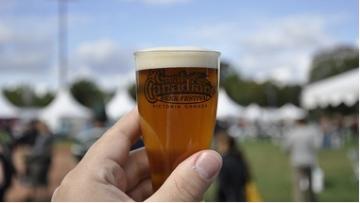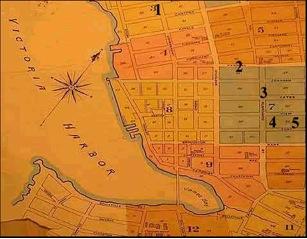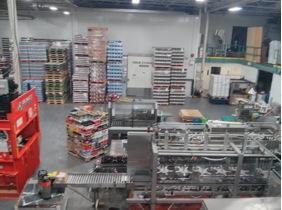
The beer culture in Victoria has come full circle. With nine breweries in the capital city the microbrewery culture of today’s Victoria is strikingly similar to that of the mid-nineteenth century. Beer is not typically associated with our provincial capital. However, there is a longstanding tradition of microbreweries and local population’s support of it. This continues just as fervently today. Beer is one of the oldest manufactured beverages in the world and it carries with it great social depth. It is an alcoholic drink made of clean water, barley, hops and other flavourings. A drink for social occasions and available at a cost to most people it is no wonder this beverage has seen a resurgence in many communities on the West Coast and beyond.
In 1858 the landscape of Victoria was one of flux. The population increased steadily with prospectors searching for gold and the businesses that followed them. Many settled in the capital region and set up shop. Breweries were not shy in establishing themselves downtown. The first was Victoria Brewery which found a home on Swan Lake in 1858, the same year the province joined Confederation. After finding the water quality of the lake was not up to par the brewery moved downtown to the corner of Government and Discovery. More followed, and by 1885 the downtown core was home to the Victoria, Bunster’s Phoenix, Bavaria and Tiger brewing companies.

These early Victoria breweries came to an abrupt end in 1917 when prohibition was enacted. Lasting for four years this period in North American history saw the demise of many legitimate breweries and the short-lived rise of several illegitimate ones. However, in Quebec the prohibition did not even last a year; consequently, breweries such as Molson survived the prohibition. These breweries pasteurized their beer to increase shelf-life and shipped it via rail to communities that had lost their local breweries. Thus an industry that had been composed of many small breweries came to consist of only a few large ones.
That is, until the early 1990s and the beginning of the resurgence of Victoria’s microbrewery culture. Laws had been amended and the local microbreweries took off. Spinnakers and Vancouver Island Brewery opened in 1984, and Swans, historically a grain house, started serving beer in 1989. The adventurous beers that these breweries produced were very different from the lagers that dominated the market at the time. The community received these styles of beers well, and the brewers were encouraged to try new recipes. This adventurousness of brewer and consumer is perhaps the key part of the craft brew culture. With the foundation of an inquisitive market, new breweries came onto the scene. The marked difference between these breweries and the more established large breweries resulted in the term ‘craft beer’ being born.
Craft brewing is not a phenomenon isolated on Vancouver Island; it is sweeping North America. And some of the Island’s best brewers are not originally from British Columbia. Tommie Grant, the head brewer at Spinnakers comes from a rebellious PEI family that turned to home brewing when confronted with the lacking selection of beers available at the government liquor stores. Coming to Victoria for better weather and work in 2002, Grant found work with a U-brew and later Spinnakers, a brewpub well known for its small batch cask ales. He got his start bottling beer in the basement and through hard work and education has moved up the ranks. Craft beer making combines art and science at very precise levels and Tommie and so many of his peers in this city are doing it at an especially high level.
Victoria brewers are pursuing sustainability in many levels of their businesses. In terms of the raw product breweries have found ways to use three of the waste products of brewing: grain, heat, and carbon dioxide. Ground, dried, sprouted barley is steeped in boiling water to produce wort, a sugary liquid that ultimately becomes beer. After the wort is removed from this mixture, the spent grain will often be sent out to farms where it makes good feed for the livestock; Spinnakers actually buys beef that had been fed its spent grain.
Other waste components of the beer-making process are composted as local businesses, like ReFuse, will come and collect your compost from kitchens and food producing industries. Phillips Brewery has developed internal recycling systems where the steam produced from cooking the beer is used to reheat water and where the heat given off by the refrigeration units is redirected to heat the offices.
 The second measure of sustainability is one that BC brewers have come together on: the BC Bottle Pool. We have all noted when consuming these products how similar the bottles are for so many different products. The reason for that is that they are part of the BC Bottle Pool, where the typical long neck brown glass bottle is washed, re-labeled and re-filled.
The second measure of sustainability is one that BC brewers have come together on: the BC Bottle Pool. We have all noted when consuming these products how similar the bottles are for so many different products. The reason for that is that they are part of the BC Bottle Pool, where the typical long neck brown glass bottle is washed, re-labeled and re-filled.
Perhaps one of the most unique methods of container sustainability is one that is older than commonly thought. The Growler is a large glass bottle purchased by the consumer and taken directly to the brewery for refilling (at an excellent price too!) Growlers were around at the same time as the first phase of the Victoria microbrewing culture. Patrons would get their bottles filled and on the trip home the carbon dioxide would escape from the bottle and make a distinctive ‘growling’ sound. The lids are better now, but the name remains. Another perk of using the Growler is that the beer you are getting is right from the source and as fresh as it can be. The choices afforded a Growler fill are often greater than the ones available in stores, and the limited run brews tend to be easier to come by when you fill up your trusty jug than trying to get a hold of one in stores.
The final way that Victoria breweries are engaging in practices of sustainability is in their community involvement. Many of us have been to events around town that were heavily sponsored by one or more of these local breweries. Rifflandia, Rock the Shores, Vic Fest and of course The Great Canadian Beer Festival; all of these and so many more are events that keep our community united through experience.
2013 marks the third year of the Phillips Benefit Brew and this year’s recipient is the Little People of BC. Previous winners of this competition are the Ancient Forest Alliance and CETUS. For each year different charities are nominated and voted on, once a winner has been decided a brew is developed and proceeds from the sales of the Benefit Brew go to the charity.
Brewing in Victoria has come full circle. The first stage of gold miners and European immigrants was the impetus for a boom in the brewing industry, and then it faded away. With the efforts of a few local brewers and their stouthearted taste buds the culture of microbrewery has come back to Victoria, and it has come with force. The efforts these local companies are making in terms of innovation, quality and sustainability should make this stage of Victoria’s microbrewing culture not fade away. So, get out there! Try something new. You never know who you’re helping out when you do.


